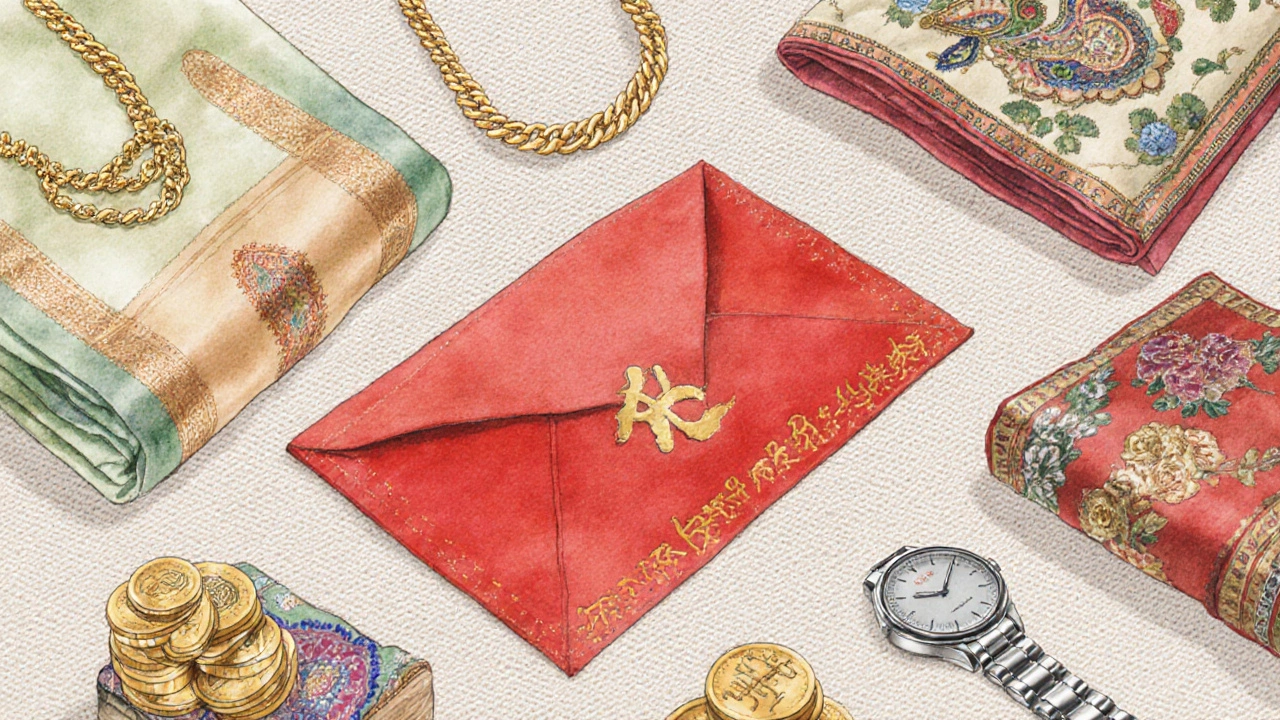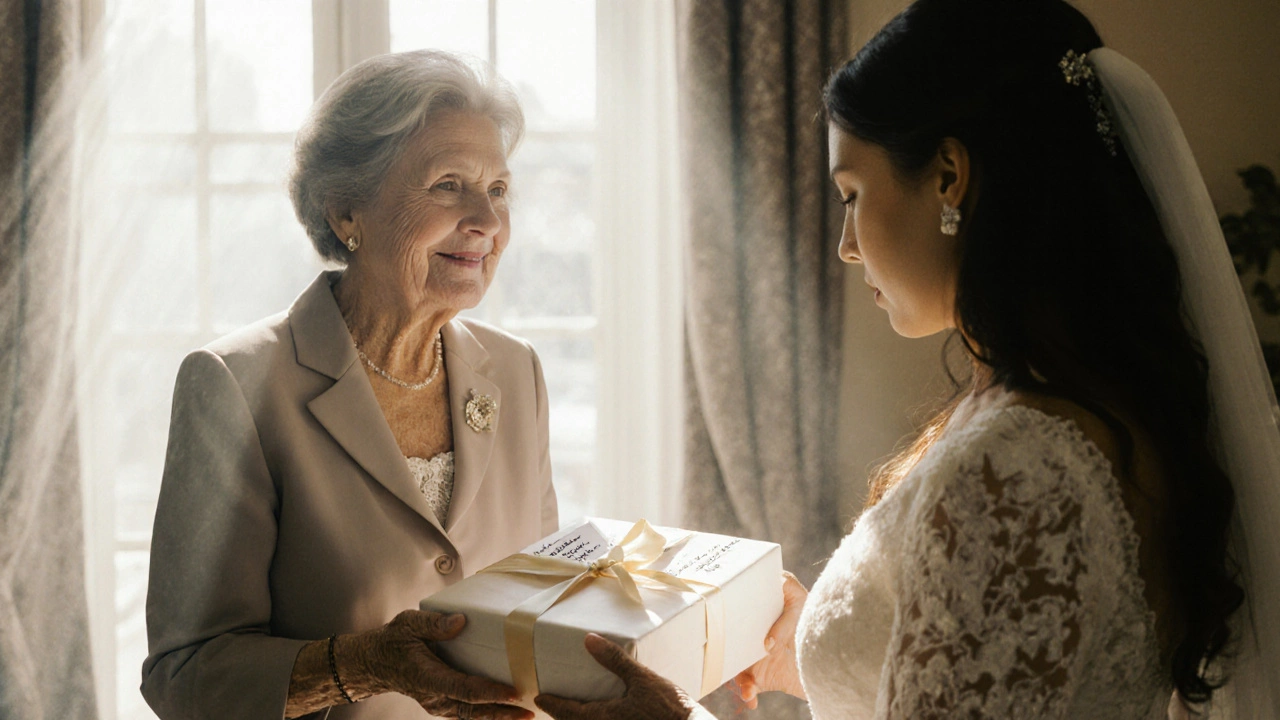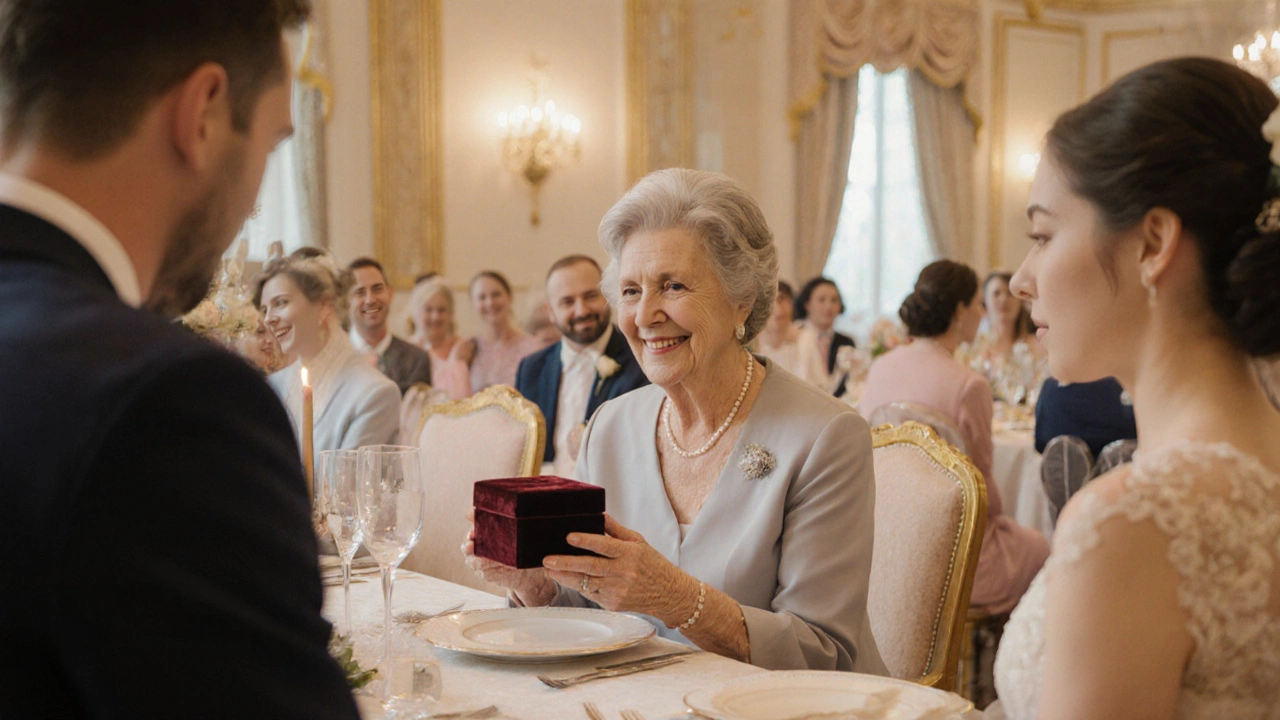Groom's Mother Gift Guide
Select a region and budget to see recommended gifts.
Gift Ideas by Culture
| Region | Typical Gift | Underlying Reason |
|---|---|---|
| North America & UK | Jewelry or cash | Balance of sentiment and practicality |
| India (North) | Gold ornaments or silk saree | Gold is a traditional store of value; silk represents purity |
| Middle East | Gold coins or a luxury perfume set | Emphasizes prosperity and hospitality |
| China | Red envelope (hongbao) with cash | Red symbolizes luck; cash supports the new household |
| Latin America | Hand-crafted ceramics or embroidered shawl | Celebrates local craft and adds a decorative touch to the home |
- Know her style. Pay attention to the colors, materials, and brands she loves.
- Set a budget. Traditional etiquette suggests a gift that’s thoughtful, not extravagant.
- Consider personalization. Adding her initials, the wedding date, or a short phrase transforms a generic item into a cherished memory.
- Check the couple’s registry. If they’ve listed similar items, you can complement the list with something extra.
- Think about usefulness. A quality kitchen gadget or a set of luxury linens can be a daily reminder of the groom’s family support.
When it comes to wedding customs, the groom’s mother gift is the token traditionally presented by the groom’s mother to the bride as a sign of welcome and support. It’s more than a pretty present - it’s a way for the groom’s family to show respect, create a bond, and often pass on a family heirloom. Below you’ll find the most common gifts, cultural twists, budgeting tips, and the best way to present the offering so it feels sincere and memorable.
Quick Takeaways
- Typical Western gifts: jewelry, cash, or a sentimental keepsake.
- Asian and Middle‑Eastern cultures often prefer gold, silk, or embroidered items.
- Personalization (engraving, monograms) upgrades any gift.
- Present the gift at the rehearsal dinner or a private family gathering.
- Follow etiquette: keep the gift modest, thoughtful, and aligned with the bride’s taste.
Why the Groom’s Mother Gives a Gift
The gesture dates back centuries when marriage was as much a union of families as of two people. The groom’s mother would offer something valuable to symbolize the bride’s new place in the family and to provide practical support for the couple’s start‑out life. Today, the tradition survives as a chance to express goodwill and to honor the bride‑to‑be.

Common Traditional Gifts
Across English‑speaking countries, these items show up again and again:
- Jewelry - a simple gold chain, a pair of earrings, or a classic watch. It’s wearable, timeless, and can be engraved with the wedding date.
- Cash or a cheque - a discreet envelope with a generous amount. It lets the couple decide how to use the money, whether for a honeymoon upgrade or a home purchase.
- Heirloom item - a family‑passed‑down brooch, hand‑stitched quilt, or a vintage brooch. The story behind the piece adds emotional weight.
- Personalized homeware - monogrammed towels, a custom‑etched wine glass set, or a decorative picture frame.
- Experience voucher - a spa day, a cooking class, or a weekend getaway. It gives the newlyweds a chance to relax after the hectic planning period.
Cultural Variations Around the World
Not every culture follows the same script. Below is a snapshot of how the groom’s mother tailors the gift to regional expectations.
| Region | Typical Gift | Underlying Reason |
|---|---|---|
| North America & UK | Jewelry or cash | Balance of sentiment and practicality |
| India (North) | Gold ornaments or silk saree | Gold is a traditional store of value; silk represents purity |
| Middle East | Gold coins or a luxury perfume set | Emphasizes prosperity and hospitality |
| China | Red envelope (hongbao) with cash | Red symbolizes luck; cash supports the new household |
| Latin America | Hand‑crafted ceramics or embroidered shawl | Celebrates local craft and adds a decorative touch to the home |
How to Choose the Right Gift for Your Bride‑to‑Be
- Know her style. Pay attention to the colors, materials, and brands she loves. If she’s a minimalist, a sleek gold pendant beats a beaded necklace.
- Set a budget. Traditional etiquette suggests a gift that’s thoughtful, not extravagant. In many Western circles, $150-$300 is common; in cultures where gold is customary, the budget may be higher.
- Consider personalization. Adding her initials, the wedding date, or a short phrase transforms a generic item into a cherished memory.
- Check the couple’s registry. If they’ve listed similar items, you can complement the list with something extra, such as a matching set or an upgrade.
- Think about usefulness. A quality kitchen gadget or a set of luxury linens can be a daily reminder of the groom’s family support.

Presentation: When and How to Give the Gift
The timing matters. Most families hand the gift during the rehearsal dinner, a private moment before the big day. If the rehearsal isn’t part of the plan, a small “pre‑wedding brunch” works equally well. Here’s a quick checklist for a smooth hand‑off:
- Wrap the item in elegant paper and a ribbon that matches the wedding palette.
- Include a handwritten note expressing your joy and offering a warm welcome.
- Hand it directly to the bride, preferably with the groom’s mother present as a trio.
- If the gift is cash, place it in a tasteful envelope and add a short, heartfelt message.
Common Pitfalls to Avoid
- Over‑personalizing. A gift that’s too niche (like a bespoke portrait of a pet) may not suit the bride’s taste.
- Ignoring cultural expectations. Giving a plain cash envelope in a culture that values gold could be seen as careless.
- Being too pricey. An ultra‑expensive piece can make the bride feel uncomfortable, especially if the couple’s own budget is modest.
- Skipping the thank‑you note. A brief acknowledgement after the wedding shows gratitude and keeps the relationship warm.
Frequently Asked Questions
Is it okay for the groom’s mother to give cash?
Absolutely. In many Western and Asian weddings, a red envelope or a neatly folded cheque is a respected, practical choice. Just make sure it’s presented in a classy envelope and paired with a heartfelt note.
What if the bride already has a full wedding registry?
Look for complementary items - think upgrades (a higher‑grade kitchen appliance), personalized versions of registry pieces, or experiences that aren’t listed, like a weekend retreat.
Should the gift be given before or after the ceremony?
Customarily, the gift is handed over during the rehearsal dinner or a private pre‑wedding gathering. Giving it after the ceremony can feel rushed and takes away from the private moment.
Can the groom’s mother coordinate the gift with other family members?
Yes, pooling resources for a larger heirloom or a group experience is common. Just ensure the final presentation feels personal, not corporate.
What if the bride’s family has a different tradition?
Respect both traditions. A balanced approach is to give a universal token (like jewelry) while acknowledging the bride’s family custom in the accompanying note.
